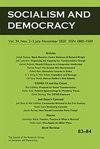《150年后的马克思资本论:对资本主义的批判与替代》
Q4 Social Sciences
引用次数: 6
摘要
《马克思150年后的资本论:对资本主义的批判与替代》收录了2017年在约克大学举行的一次国际会议的会议记录。这是包含卡尔·马克思主要著作的理论和政治性质、利害关系和含义的系列汇编的最新版本。在马克思主义和马克思主义学术的争议领域中,有17位不同政治派别、理论立场和直接关注点的贡献者,这些干预的相对和平共存,至少证实了过去几十年在《资本论》研究中实现的突破是持久的。换句话说,我们现在对《资本论》有了一种全新的、共享的理解,既使它远离了古典政治经济学的前提,又反对将其定理和结论作为封闭的整体来呈现的解释性(和编辑性)野心。谨慎地辨别《资本论》的多重层次,这是一项正在进行的任务,不能简化为跨学科划分和对话的标准概念,将有助于动员它作为任何一种批判性地重塑社会科学的倡议不可或缺的工具。本文章由计算机程序翻译,如有差异,请以英文原文为准。
Marx’s Capital After 150 Years: Critique and Alternative to Capitalism
Marx’s Capital After 150 Years: Critique and Alternative to Capitalism contains the proceedings of an international conference held at York University in 2017. It is the latest addition to the series of compilations that encompass the theoretical and political nature, stakes and implications of Karl Marx’s major work. With 17 contributors of diverse political affiliations, theoretical standpoints, and immediate concerns within the contested terrain of Marxism andMarxian scholarship, the relatively peaceful coexistence of these interventions, at the very least, confirms that the breakthroughs realized in the last few decades in the study of Capital proved to be lasting. In other words, we now have a qualitatively new, shared understanding regarding Capital that both distances it from the presuppositions of classical political economy and opposes the interpretative (and editorial) ambitions to present its theorems and conclusions as closed totalities. Cautiously discerning the multiplicity of layers of Capital, an on-going task that is irreducible to the standard notion of interdisciplinary compartmentalization and dialogue, shall serve to mobilize it as an indispensable tool for any kind of initiative to critically recast the social sciences.
求助全文
通过发布文献求助,成功后即可免费获取论文全文。
去求助
来源期刊

Socialism and Democracy
Social Sciences-Sociology and Political Science
CiteScore
0.50
自引率
0.00%
发文量
34
期刊介绍:
Socialism and Democracy is committed to showing the continuing relevance of socialist politics and vision. Socialism and Democracy brings together the worlds of scholarship and activism, theory and practice, to examine in depth the core issues and popular movements of our time. The perspective is broadly Marxist, encouraging not only critique of the status quo, but also informed analysis of the many different approaches to bringing about fundamental change, and seeking to integrate issues of race, gender, sexuality, ethnicity and nationality with the traditional focus on class. Articles reflect many disciplines; our geographical scope is global; authors include activists and independent scholars as well as academics.
 求助内容:
求助内容: 应助结果提醒方式:
应助结果提醒方式:


